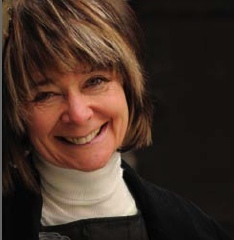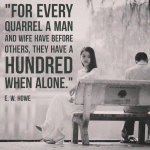After twenty five years and eleven books, Sarah Dunant wouldn’t dream of switching careers; unless she suddenly woke up with a voice — singing that is. Extensive research and raising two children has kept her pretty busy. She currently divides her time between London and Florence. How dreamy is that? Her latest release, Sacred Hearts is about a young woman in Renaissance Italy who is forced into a convent against her will. Read on to learn more about her, writing, and her novels.
Moe: When did you ‘know’ you were a writer?
 Sarah Dunant: I think the moment must have been when I sat down at fifteen years old and started to write a short novel about Elizabeth’s first imprisonment in the Tower of London in the 1540’s. It was written in an exercise book covered with left over wallpaper from my parent’s house. It had, I seem to remember, about four adjectives to every noun and luckily it got lost somewhere in my life so it can never be produced as evidence against me.
Sarah Dunant: I think the moment must have been when I sat down at fifteen years old and started to write a short novel about Elizabeth’s first imprisonment in the Tower of London in the 1540’s. It was written in an exercise book covered with left over wallpaper from my parent’s house. It had, I seem to remember, about four adjectives to every noun and luckily it got lost somewhere in my life so it can never be produced as evidence against me.
Moe: What inspires you?
Sarah Dunant: That there are so many things I don’t yet know and have so little time to learn them in. Right at present, I am intoxicated by the richness of history. There is much to learn about the forces that made people who they were in the past, the lives they lived, and the great challenge offered to a writer to try and bring them alive for a contemporary audience.
Moe: Every writer has a method to their writing. On a typical writing day, how would you spend your time?
Sarah Dunant: I am very driven. I get up at 8.30, go to gym, swim for twenty minutes, come home, make a cup of coffee, sit down at the computer and don’t leave until I am too tired to think any more. Some days it flows, some days it doesn’t but even at its worst, I never look at the clock. That is how absorbing it is.
Moe: How long does it take for you to complete a book you would allow someone to read? Do you write right through or do you revise as you go along?
Sarah Dunant: Along with research which takes at least nine months to a year, maybe two and half years from idea to delivery. And I revise constantly. I think one of my mantras would be “all writing is rewriting…”
Moe: When you sit down to write is any thought given to the genre or type of readers?
Sarah Dunant: No. It is hard enough to write without having to constrict yourself by thinking of a particular genre or a particular audience. In the end you have to write for yourself and for the power of the story and hope that if you get it right others – whoever they are – will want to read it.
Moe: When it comes to plotting, do you write freely or plan everything in advance?
Sarah Dunant: When I started, I used to plot a lot more than I do now. But I cut my literary teeth on thrillers and they take a great deal of plot construction. They instilled in me an almost innate sense of pace, so that now I can be more free wheeling. The more confident I have gotten, the less I know what I am doing when I start. That way, as you get to know the characters better (and the unfolding story) they take you in directions which you could not have imagined when you started. If you surprise yourself, you will also surprise the reader. Working in history, the research and things you discover on the way often suggest the twists and turns you need to keep the pages turning.
Moe: What kind of research do you do before and during a new book? Do you visit the places you write about?
Sarah Dunant: A huge amount. My last three novels have been set during the Italian renaissance in Italy, so before I type the first word I need to do almost a mini history degree on the place, the moment, the history and the people. Luckily I love it: sitting in libraries with a whole world unfolding in my lap. For The Birth of Venus, I spent months in Florence digging into the 15th century. For In the Company of the Courtesan, I lived for a short while in Venice. And for Scared Hearts, set in a convent, I spent time in the city of Ferrara, but also in a modern convent! That was the most arduous piece of research I ever did, as it involved getting up at 4.00 am in the morning to attend Matins service along with the nuns.
Moe: Where do your characters come from? How much of yourself and the people you know manifest into your characters?
Sarah Dunant: My characters come from history. That is not to say they are known historical figures — far from it. I use the history and all the detail of research, large and small, to bring to life imagined characters and then watch how they behave as they are plunged into the historical forces around them.
I never consciously write about either myself or anyone I know. I feel strongly that fiction should be just that. Fiction, made up, not stolen from other peoples lives. Luckily working in the 16th century means I have no option but to make it up, since no one has first hand experience I can draw on!
Moe: Do you ever suffer from writer’s block? If yes, what measures do you take to get past it?
Sarah Dunant: Yes, and it is the most terrifying thing in the world. Sometimes it is because you have not thought deeply enough about the story or the characters, but sometimes it is just how it is. There is no “cure” or easy fix. All you can do is sit it out. But the longer I write, the longer I realize that being lost is also part of the process. So now I accept that at some point I will be in despair. And that out of it will come solutions and hard won triumphs.
Moe: Can you share three things you’ve learned about the business of writing since your first publication?
Sarah Dunant: That you just have to do it. However hard, however, scary, you have to get to the keyboard every morning and stay there.
That it will often get worse before it gets better.
And don’t worry about being afraid. Everybody is.
Moe: What is your latest release about?
Sarah Dunant: Sacred Hearts is the third in a set of novels about women in Renaissance Italy at a time when half of all noble women were put into convents because it was too expensive to marry off all daughters to a flesh and blood husband. It is set entirely behind the walls of a convent and is the story of young woman who is forced in against her will and is determined to get out. Along the way, it is about rebellion, friendship, betrayal, the clash between strict religion and a more loving God, the drama and power of ecstasy, and the strange but sometimes enormously creative life of nuns.
Moe: When you’re not writing what do you do for fun?
Sarah Dunant: I listen to music. Dance. And travel.
Moe: New writers are always trying to glean advice from those with more experience. What suggestions do you have for new writers?
Sarah Dunant: I think I have already said it. Keep on whatever the pain. Don’t listen to the voice that says you can’t do it: it is lying. Remember that the best things in life are not always easy.
Moe: If you weren’t a writer what would you be?
Sarah Dunant: A singer. But only if I woke up tomorrow and found I had a voice.
Moe: What is your favorite word?
Sarah Dunant: Imagine.
- Sarah Dunant’s Sacred Hearts is available at Amazon.com.
- Sarah Dunant’s Sacred Hearts is available at Amazon.ca.
Originally published 10/29/2009 at Literary Fiction, BellaOnline.






Leave a Reply